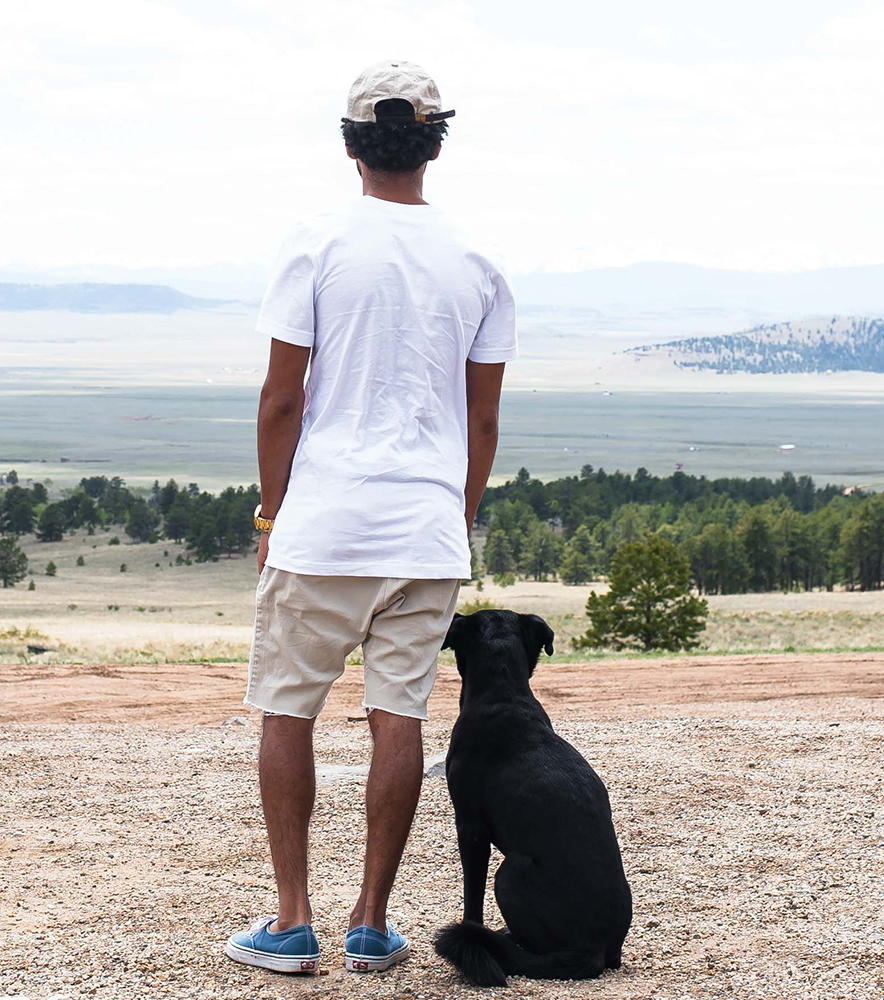Archive for the ‘Service Dog Tips’ Category
If you have a disability, you may qualify for a service dog. Colorado law aligns with federal guidelines. These guidelines allow a person with a disability to reside, travel, and perform their activities of daily living with a service dog. Colorado also takes the extra step to protect service dogs who are still in training (Colorado Revised Statute 24-34-803), enabling them to train with their handlers in public areas. Continue reading for more information on Colorado service dog requirements.
Definition of a Service DogA service dog is trained to carry out specific tasks to assist a person with a disability. The disability can be physical, mental health-related, or medical. Colorado follows the American with Disabilities Act by restricting service animals to canines and miniature horses. A canine does not have to meet any specific requirements regarding height or weight. Colorado does, however, ban pit bulls but not from performing as service dogs.
The task a service dog performs must be related to their owner’s disability. The task(s) must be an act that their owner would not be able to perform easily or safely without assistance.
How is the Service Dog Trained?To be a legitimate service dog, a dog must be trained to perform a task specific to their owner’s disability, as stated above. As an example, some service dogs are trained to bring objects such as medication bottles or walking canes. Others prevent their owners from falling by allowing themselves to be used as physical support. Training can be performed through a professional trainer or by the owner (or owner’s family).
Identification Requirements for a Service Dog in ColoradoAlthough Colorado does not require any identification requirements for service dogs, it’s always good to register your service dog. Doing so prevents any problems or misunderstandings from occurring, allowing your dog to perform their duty with fewer interruptions.
In Colorado, businesses are only legally allowed to ask two questions when it is not apparent that the dog is a service animal:
Is this a service animal? What task has the animal been trained to perform?Due to privacy concerns, business and private entities may not ask personal questions such as:
Ask the owner to declare their illness or disability. Demand documentation regarding registration or training. Ask the owner to have the animals perform their assigned task as a demonstration.Colorado does not require a service dog to have a vest or identification tag stating that they are service dogs.
A registered service dog in Colorado can perform their duty with fewer interruptions. Service Dog Registration in ColoradoAlthough service dog registration is not required by law in Colorado, it does provide peace of mind. Having an extra layer of protection and privacy for a dog and its owner can make all the difference. Service dogs perform better in calm environments with few interruptions, and registration allows just that. Having documentation at the ready garners legitimacy and respect from business owners and the public, enabling service dogs to remain undisturbed.
People who are interested in training, certification, and registration in Colorado can inquire with Service Dog Certifications, their local service dog trainers, or county animal enforcement department in the Colorado area.
Psychiatric Service Dog RequirementsPsychiatric service dogs are not the same as emotional support animals. Psychiatric service dogs are trained to perform a task that is tailored to meet a psychiatric patient’s needs. For instance, a psychiatric service dog may be trained to performing the following tasks:
Remind their owner to take their psychotropic medications. Apply deep pressure therapy. Interrupt any self-harm behavior. Alert others when a person with a psychiatric disability becomes agitated. Service Dog or Emotional Support Dog in ColoradoColorado requires that a service dog or emotional support animal always be tethered or harnessed and must remain under their owner’s control at all times unless such a device interferes with their ability to perform. Any disruptive or dangerous behavior can have the animals removed from the area. Service dogs are working animals and can not play, be fed, or perform tasks for anyone else other than their owner.
If your dog isn’t specifically trained to perform a task, you may still qualify for an emotional support dog (ESA). Emotional support animals are recognized as assistance animals, but do not have the same access rights as service dogs. ESAs provide support and comfort to owners that suffer from depression, anxiety, PTSD, etc., and can live and travel with their owners without having to pay additional pet fees.
You and Your Service Dog in ColoradoAfter your dog finishes their training, you are approved by Federal law to bring your service dog with you in public. Because a service animal adds to the safety, well-being, and quality-of-life of its owners, service dogs are allowed into general public areas. This includes buses, trains, and other forms of public transportation.
If a service dog sounds like a good fit for your disability, you can speak to your healthcare professional for their consultation. Your healthcare professional may be able to point you in the right direction and help you obtain a service dog. It’s vital to ensure your service dog is well-behaved and able to tolerate the public. Aggressive outbursts, disruptive behavior, or violation of sanitary standards can prevent your service dog from doing their job.
Service dogs are a joy to have and can lighten the load for many people with disabilities. Knowing what you can and can not do with your service dog within Colorado is essential for both you and your dog.
Colorado boasts one of the top national park systems in the United States. In Denver alone, 79% of its residents live within a half-mile of a park. The widespread availability of parks makes Colorado a great place to have a service dog.
With all the options available for outdoor activities, getting your service dog registered in Colorado is a good idea. As service dogs are an essential part of their owner’s health and quality of life, registering your service dogs allows your dog to do its job with fewer distractions.
Determine if You Need a Service DogAccording to the Americans with Disabilities Act (ADA), a disabled person is defined as a person with physical or mental impairment that substantially limits one or more major life activities.
Before starting the journey towards getting a service dog, assess what your needs are. Can a dog be trained to perform a task related to your disability? For example, if you have problems with falling, you may be able to train a dog to assist you as walking support. Set realistic expectations for a service dog. Determine what needs can be met by a service dog, and inquire with your healthcare provider.
Choose the Right Breed for Your NeedsAlthough you may have a favorite dog breed, that particular kind may be unable to assist with your needs. When purchasing or rescuing the right breed as a service dog, it’s essential that the dog can fulfill the task. For instance, using a small pomeranian to assist in preventing you from falling isn’t realistic or safe. A large Saint Bernard, however, can easily prevent you from falling and do the job well.
Train Your Dog for Your DisabilityTraining a service dog is a vital part of the process. A service dog should be well-trained to ensure that the required tasks can be performed. A well-trained service dog can keep you out of harm’s way. There are three common options to get a trained service dog:
Purchase a trained service dog: You may buy a service dog that has been trained for the task you require. A pre-trained service dog is the simplest but also costliest option. Outsource the training to a professional trainer: You may already have a dog or adopt a new one. The trainer will help you get your service dog ready for the tasks needed. Purchase and train the dog yourself: This is the least expensive option, but also the most time-consuming option. Although training a dog yourself may require a lot of research, time, and effort, there are significant benefits to this option. Performing the training yourself develops a bond with your service dog, and you can personalize the instruction to fit your individual needs.A significant amount of time and money goes into training a service dog. By registering your service dog, you are ensuring full use of your dog without having to field too many personal or medical questions from the public.
Registering Your Service Dog in ColoradoRegistering a service dog takes a little work on the front end, but saves you a lot of time on the back end. With a registered service dog, the public is more likely to accept your dog’s presence. This makes it less likely that you will encounter any resistance from people ignorant of service dog laws.
How to Register Your Dog as a Service Dog Provide the service dog handler’s name in the appropriate fields. Type in the service dog’s name in the appropriate fields. Type in your email address. Be aware that a few sites may require the additional step of verifying the email address. This extra step is to ensure your information is correct and there is a way to validate your request. Provide a current photo of your service dog by uploading it onto the website. Choose a clear and recent picture of your dog. Select the format of the registration. You may choose to select a paper certificate, identification card, service dog leash cover, etc. Register your dog as a service dog in Colorado in just a few steps. Why Should I Register My Dog as a Service Dog?Although the ADA does not require registration, it’s still a good idea to do so. By registering your service dog, you’re taking the next step to validate their importance. Registration allows you more privacy, as people are less likely to inquire into your background and medical history.
And because there are unscrupulous people who have fraudulent service animals, the public may have issues trusting the legitimacy of a service animal. Registering your animal provides immediate proof and a simple way to communicate your need for the animal. It also helps to dissuade fraudulent owners from posing their dogs as service animals. By registering your service animal, you are helping to rebuild the public’s respect and trust.
Colorado StatuteColorado takes misrepresentation of service animals seriously. Owners who call their pet falsely a service animal may receive a fine anywhere from $50 to $500.
Colorado Service Dog NewsBe mindful when looking for a trained service dog or when outsourcing training. Some training sites may not train the dog sufficiently, which can lead to behavioral problems and dangerous situations. In 2017, a service dog training company was found to have skipped vital portions of the training program, leading to behavioral issues in their service dogs.
To raise and maintain a service dog can cost a pretty penny. According to the Freedom Service Dogs of America, the cost of a Service Dog is approximately $25,000. Forbes magazine estimates a regular dog ownership to start at $17,650 and can go as high as $93,520 depending on the breed and size of the dog.
Acquiring and training a service dog is costly. And having a service dog does come with some dismay from individuals who may not understand the owner’s needs. Therefore, some handlers decide to register their Service Dog in order to make the dog’s purpose more transparent.
Though service dog owners sure want to keep their service dogs well-taken care of, it can be a lot of money. Therefore, every little dollar counts. The following are a few money saving tips for you and your service dog.
1. Purchase Dog Food in BulkIt’s not easy dragging large bags of dog food around, but the savings might be worth it. Especially for large dogs, food can cut quite a chunk into your budget. One way to save money is purchasing dog food in large amounts when there is a sale or from big-box stores. If you don’t think you’ll be able to use up the food before it expires, you may want to ask a friend who has the same sized dog to split it with you.
Sharing the costs and buying in bulk can save you a lot of cash in the long run.
2. Groom Your Service Dog at HomeDog grooming can be expensive. However, it’s a necessary part of keeping your dog healthy. That said, grooming your own pet can also be difficult! If money is a big concern, make grooming your own dog a priority. There is a learning curve involved in grooming your dog, so make sure you educate yourself first. Start small by learning how to clip and buff your dog’s nails. Then move on to shampooing and cutting hair. Online tutorials, books, and web articles can teach you. Just know that you may need to invest in quality grooming tools in the beginning, but the cost savings will make up for them!
3. Start Coupon Clipping For Your Service Dog NeedsEven if you don’t do it for your own groceries, you can start coupon clipping for your service dog. Every little coupon counts. You don’t need to wait for the Sunday newspaper to clip coupons anymore; You can search for them online. The pet store and your veterinarian may also have coupons available, so don’t be afraid to look around or to ask.
A service dog appreciates love and care more than receiving expensive goods. 4. Become Your Service Dog DIY ExpertYou can learn to DIY your dog’s products. Make it a hobby and it becomes fun! Your service dog won’t know the difference between a high-end doggy bed versus a DIY one. All your service dog will know is that it belongs to them and it’s full of warmth. You’ll see the gratitude in their eyes and feel proud that you made it for them! Even toys and dog houses can become DIY projects. You’ll enjoy finding the right DIY project for you and your service dog.
Your service dog won’t know the difference between a high-end version versus a DIY item.
5. Prevent Potential DangersPrevention is key. Dog-proof your home to keep your service dog safe. Keep potential poisons away from your pet. Ensure your gates and fences can endure the onslaught of your service dog. Preventing accidents from happening will save you the tragedy having to take a sick or injured dog to the vet.
Prevention also comes with maintaining your service dog’s health. Provide your dog with ample space to run, give them enough exercise, and maintain their weight. Veterinary fees can pile on when your dog is unhealthy. Start paying close attention to your dog’s health from the get-go and prevent veterinary fees in the future.
If your money is tight and you don’t mind, many veterinary schools provide discounts with students in training. The services may be very basic, but the monetary savings are great. Service can include check-ups, vaccinations, and spaying and neutering. Stick to an accredited veterinary college and call around your area if you’re curious about the savings.
Your Service Dog’s Love Does Not Need RichesYour service dog will love you, regardless if their supplies are exquisite or bought from the dollar store. How you treat your service dog and care for them speaks more than a pricey outfit. Be mindful of what you spend money on and you can save money bit by bit.







